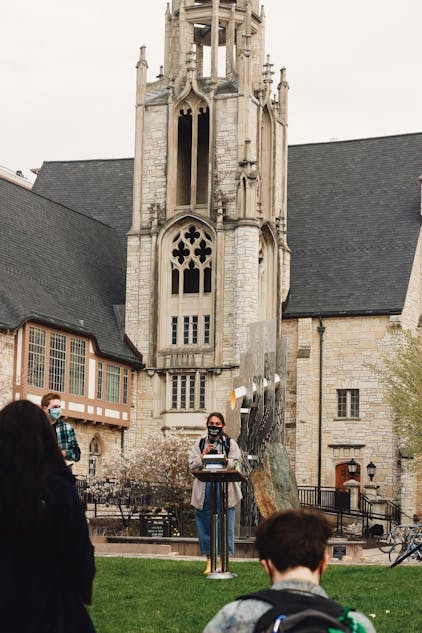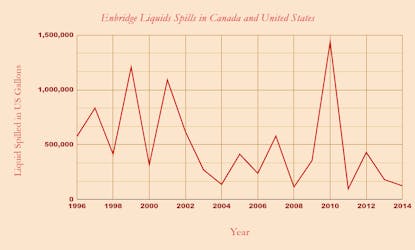It may be the beginning of the end for fossil fuel dependency as oil infrastructure corporations like Enbridge and TC Energy face increasing opposition from indigenous people and environmental activists.
Pipeline 3, originally built in 1961, is a crude oil, specifically tar sand, pipeline which runs from Alberta, Canada through Minnesota and Wisconsin. The Canadian energy company Enbridge is now building a newer, larger, pipeline in its place that will be able to carry more oil. They have completed the segments through Wisconsin and North Dakota but are still in the process of construction in Minnesota. Enbridge claims that this will replace the existing pipeline, while movements against Pipeline 3, such as Stop Line 3 and Honor the Earth, believe that this will function as an additional pipeline as it will carry much more oil.
Since the 1,700 mile-long Keystone XL pipeline project was halted once more through an executive order by U.S. President Joe Biden on his first day of office, some hope that new similar large-scale pipeline projects such as Pipeline 3 will also be canceled. Biden stated that the project would not be consistent with his administration’s climate policy standards.
Stop Line 3 and Honor the Earth are still fighting to prevent the damaging effects the pipeline poses on sacred indigenous land and the environment. The pipeline’s construction is a destructive process of deforestation and damaging wetlands, and an oil spill from the pipeline threatens the well-being of the Anishinaabe tribe’s sacred wild rice and the Mississippi River’s watershed. The construction of Pipeline 3 is being called Enbridge’s “last attempt” by environmental activists and halting the project would create a transition away from US dependence on oil.
Threat to Indigenous Rights
Sirkka Miller, a graduate student at the University of Wisconsin-Madison, is conducting a research project analyzing anti-pipeline activist groups, particularly with a focus on Line 3. According to Miller, Anishinaabe people were forced onto the reservations by the US government and now their treaty rights of control over their sovereign land are not being held up. The pipeline’s new corridor in Minnesota would violate treaty rights from 1842, 1854 and 1855 by cutting through five indigenous reservations of the Anishinabe Tribe.
Miller said that this is “another violation that continues a pattern of cultural genocide” of the US government against indigenous culture.
Joye Braun, otherwise known as Eagle Feather Woman, from the Lakota Tribe, said at an online meeting against Liberty Mutual, which insures Pipeline 3, that indigenous people are constantly being put at the forefront of environmental destruction such as the fossil fuel and coal industries due to systemic racism. Liberty Mutual refused countless requests to meet with indigenous leaders and the frontline community impacted by this insurance, according to Braun.
“These [insurance] companies and the fossil fuel companies are digging new coal mines and building tar sand pipelines, like Line 3 and Trans Mountain, and expanding oil and gas drilling without the free prior consent of impacted indigenous communities,” said Braun.
Indigenous women and children, in particular, are endangered by pipeline construction on reservations. According to data provided by the CDC in 2016, homicide is the third leading cause of death for American Indian and Alaska Native women under 20 years of age. Native Americans are also more likely to be killed by law enforcement than other racial or ethnic groups.
In February, two Line 3 workers were arrested for human trafficking in Minnesota, one of whom was charged for soliciting sex with a minor. Furthermore, according to Stop Line 3, a non-profit near the Red Lake reservation that provides emergency services to sexual and domestic violence victims has had an increased demand for help since construction began on the Line 3 pipeline. The Violence Intervention Project submitted a document to the Minnesota Public Utilities Commission (PUC) that says local women and girls are getting verbally harassed by Line 3 workers.
Environmental Impacts
Meline Leboucan, from the indigenous Cree Nation in Canada, said that there are multiple tar sand pipelines going through their land, and glaciers are drained to feed the pipelines which toxify the water. She showed photos of her and her family cleaning up a spill of 250,000 liters of oil from a pipeline in 2016, rather than Husky Energy, which owned the pipeline.

Aliva Arredando, a climate and indigenous rights activist, gave a speech against Pipeline 3 at the Climate Strike on April 23.
Leboucan explained the consequences of the environmental destruction on their territory, “Our family members have elevated rates of cancer, we have a toxic burden we carry for the global addiction [for fossil fuel] on our shoulders.”
Enbridge infrastructures have been responsible for 1,276 liquid spills from 1996-2014 totaling 9,423,708 US gallons, causing detrimental environmental and safety issues.
“Pipelines always break almost inevitably. Tar sand is especially harmful; it’s jam-packed with chemicals to keep it liquid,” stated Miller.
Aliva Arredando, a climate and indigenous rights activist who spoke at the Climate Strike on the campus of the UW-Madison, stated that “Enbridge cannot promise that these pipelines won’t spill. They will. And that is detrimental because it is being built on hundreds of acres of Anishinaabe tribes. It will ruin their way of life.”
According to MN350, a climate change movement based in Minnesota, Pipeline 3 is projected to double the flow of the old pipeline as it will be replacing up to 370,000 more barrels of oil a day. The additional oil transported through Line 3 is the equivalent of the total CO2 daily emissions of 16- 18 million cars for every year the pipeline operates. Line 3 has an estimated cost to society of $287 billion in climate change-related damage over the next 30 years.
Protests against the Pipeline
Aliva Arredando went to two protest camps against Pipeline 3 this past winter in Palace, Minnesota.
“It was all run by indigenous women and everything was very cryptic… They briefed us on what to do if you do get arrested and gave us personal bail information so they can bail you out,” she described.

Liquid spills from Enbridge infrastructures in Canada and the United States from 1996 to 2014. In 2010, the Kalamazoo river spill from an Enbridge pipeline was the second-largest inland oil spill in the US of all time.
Protests against the pipeline have been mainly led by the women of indigenous tribes, a group that is also disproportionately victims of violence. Claire Cambray, a student at the University of Minnesota-Twin Cities has participated in protests against Line 3 for the past year.
“When there [are] pipelines built thorough indigenous camps, the men's camps where workers live become hot spots for violence towards women, trans and non-binary people. There has been an uptick in missing and murdered indigenous women in the area,” she said.
There are multiple protest camps along Pipeline 3, as well as protests in urban areas — such as the Twin Cities — to increase the issue’s notoriety, according to Cambray. In March, Cambray attended a protest where over a hundred people drove from the Twin Cities and different parts of the country. Iconic indigenous water protectors including Winona LaDuke and Tara Houska spoke at this event.
“I had tears in my eyes because of the way they talked about the land and seeing the people who had come,” Cambray reminisced. Cambray was convinced to get involved in the pipeline protests after hearing that Line 3 was Enbridge’s last pipeline project in the works.
“Hearing people say that it was a key battle makes it feel like a turning point,” said Cambray.
Alternatives to the Pipeline
Enbridge’s website states that the pipeline is essential to deliver the crude oil needed by refiners and used by residents and that construction will create 8,600 jobs. Enbridge also claims the project will give a $2 billion boost to the Minnesota economy during design and construction, with $1.5 billion from Enbridge alone.
In response to claims like these in favor of the pipeline, Sirkka Miller responded that “there are so many other ways to create jobs. We have to recognize that the federal government has the power to invest in green jobs, but it’s not being prioritized. Instead, they go to fossil fuel and coal manufacturing.”
According to Miller, what is needed is a focus on the production of renewable energy for which the technology is already available.
“Just because we’re addicted to this level of fossil fuel consumption now doesn’t mean we always have to be,” Miller explained optimistically.
The question now lies in whether Pipeline 3 will continue construction or if the presidential administration will heed the calls of the people’s protests and intervene once again.
“Pipeline 3 is the last chance to get tar sands out of Alberta. It is the biggest project in history in terms of the amount of oil being transported. If it were to be shot down, it would be the end of the tar sands industry,” said Miller.






